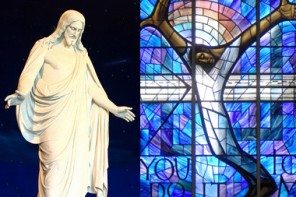There it is, near the top of the transcript, dangling like a loose thread just begging to be tugged.
Barack Obama’s widely-praised speech on race also contains a brief but dismaying comment on foreign policy that is as blind to the consequences of American global power as his analysis of America’s racial history is clear-eyed.
Referring to remarks from Rev. Jeremiah Wright that he says “expressed a profoundly distorted view of this country,” Obama decries “a view that sees the conflicts in the Middle East as rooted primarily in the actions of stalwart allies like Israel, instead of emanating from the perverse and hateful ideologies of radical Islam.”
And what geopolitical conditions help to radicalize Islam? In a sophisticated speech that deftly traces the genealogy and evolution of the collective emotions shaping American race relations, Obama misses an opportunity to relate the anger that festers on both sides of the black-white racial divide to the equally poisonous antagonism between the United States and much of the Muslim world.
“Simply to wish it away,” Obama says of racial anger, “to condemn it without understanding its roots, only serves to widen the chasm of misunderstanding.” The same could be said (in fact, it must be said) of the rage that fuels anti-Americanism in the Middle East, but neither Obama nor either of his main competitors in the race for the presidency has demonstrated any inclination to engage in this kind of self-reflection around the issues of terrorism and radical Islam.
To their credit, Obama and Hillary Clinton have shown a greater reluctance than John McCain to continue the current administration’s strategy of building foreign policy on the impulse to point a finger at “evildoers.” But, sensitive political animals that they are, both Clinton and Obama also know that many Americans take heated exception to anyone who dares to challenge the myth of American exceptionalism.
“How could we be wrong,” asks the stiff-necked patriot, “if we’re always right?”
This disinclination toward critical self-reflection is largely a legacy of our own history of radicalized religion. Calvinists fleeing religious persecution were among the first English-speaking settlers in this country, and their survival in what was for them a harsh New World would have been impossible without their unshakable (and unquestioning) belief in the righteousness of their cause.
Puritan certitude in divine election, as much a response to oppression as an exercise in theology, spun itself into the cultural DNA of the new nation; a trait in the American national genome that might be called the Puritan Narcissus.
Rather than confining this aspect of early American identity to the spiritual realm, the Constitutional separation of church and state has meant that, over the course of our history, an inflated sense of purpose coupled with a seldom acknowledged tendency toward violence has expressed itself in secular movements and institutions that are often tinged with religious zeal.
Examples of this distinctive feature of the American psyche include Manifest Destiny (and the Native American holocaust), Anti-communism (and the cultivation of proxy wars and right-wing client states) and, most recently, the War on Terror (which has entailed torture, the expansion of secrecy and surveillance, and the deaths of tens of thousands of Iraqis).
The brighter the ardor burns, the deeper the darkness becomes.
Perhaps the greatest and most damaging expression of the Puritan Narcissus is the rise and global spread of American consumerism. Heedless of the consequences, Americans have developed a way of life that requires an astonishing expenditure of energy on a planetary scale. Our own appetite for petroleum (more than 20 million barrels a day) accounts for a quarter of the world’s demand while our hunger for inexpensive consumer goods drives industrial expansion in India and China, for whom the United States is the largest export customer.
Most of our politicians trade on the illusion that the globalization of American (and American-style) consumerism is synonymous with democratization and social stability. In fact, stabilizing the supply of energy to the transnational economic grid has meant our investing billions to support politically destabilizing alliances and undemocratic regimes in the Middle East and elsewhere.
Islam, like Christianity, contains seeds of violence and radical orthodoxy that readily sprout under the right conditions. (And any Christian who feels rage at that assertion is literally embodying the truth of it.) Thus, in an age when our soldiers guard oil pipelines in countries where suicide bombings are common occurrences or where “elected leader” is an oxymoron, it’s tragic folly for Americans not to acknowledge that our way of life is as much the parent of Islamic radicalism as a bearded prophet shaking his fist at us from the mouth of an Afghan cave.
“Understanding this reality requires a reminder of how we arrived at this point,” Obama says of American race relations. The key word in that sentence is “we.” Like blacks and whites, we—Americans and Muslim radicals—are the co-authors of our shared history, the worst chapters of which our denial dooms us to repeat.


